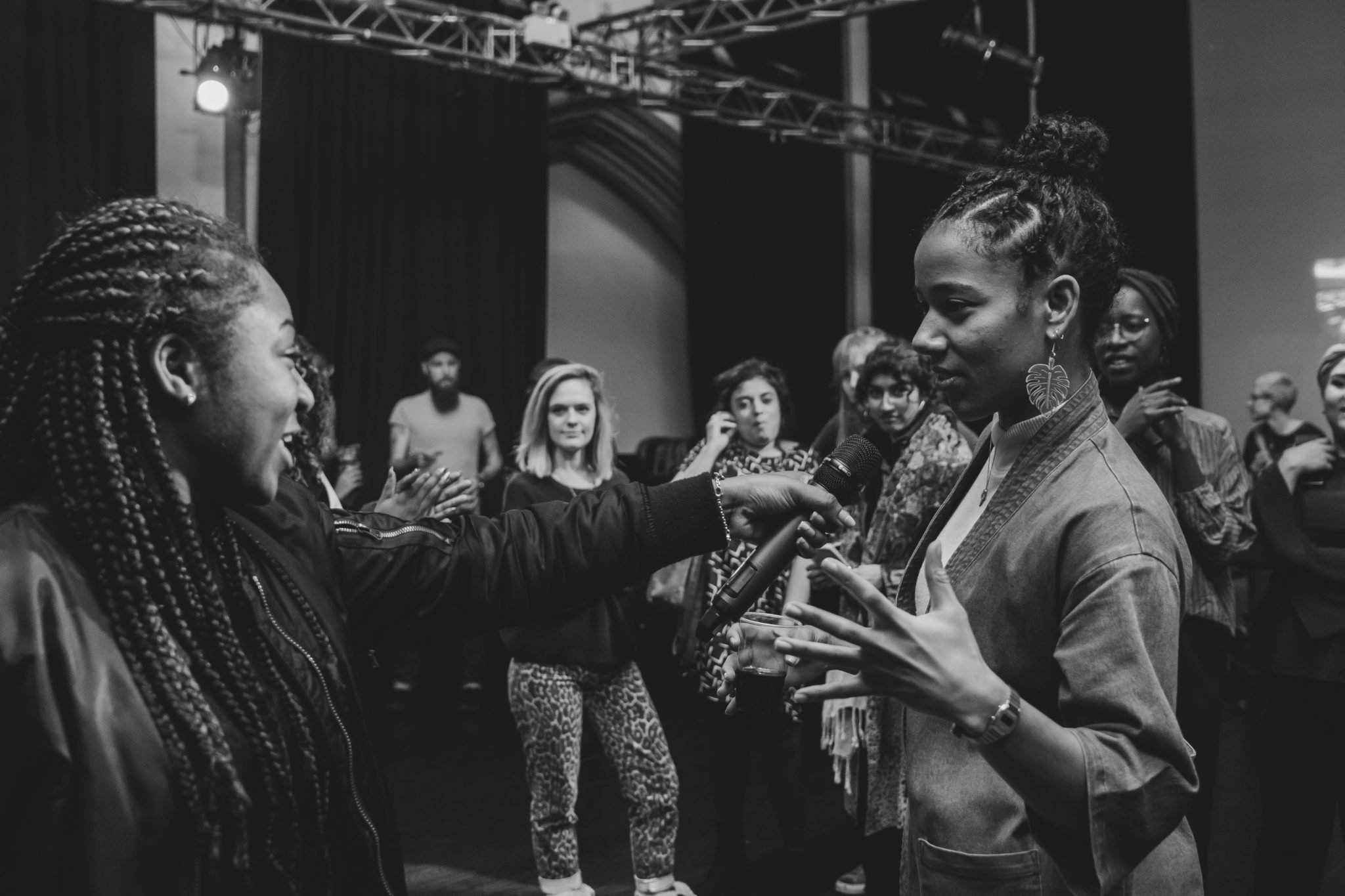Whose Culture celebration reflection
The Rising team reflect on the success of the Whose Culture Celebration that happened on Tuesday 4th December 2018 and the amazing people that contributed to creating such a open and positive event.
Photo credit: Shamil Ahmed
Whose Culture is an arts activist project that believes Bristol culture should be more representative, accessible and relevant to young people of colour in the city. We believe we should get to define what culture means to us, and that Bristol’s cultural institutions should listen. Whose Culture is a network, research and lobby group made up of young people of colour who want to affect cultural strategy in the city and provide support for each other. On Tuesday 4th December, Rising had its ‘Whose Culture Celebration’ – and its safe to say, it was nothing short of epic.
The event was an opportunity for us to celebrate the people and the achievements behind the project, consolidate the learning and the network that we’ve built through the conversations that Whose Culture has inspired and explore how we can continue this conversation on a bigger and better scale. We’ve been asking some important questions about what culture means to young people of colour in Bristol today.
Who has control over and access to that culture?
What can arts organisations in the city contribute (if at all) to that conversation?
It has been a busy six months for Rising and the Whose Culture team. We’ve been exploring new and creative ways to ask the questions. We recognise that it’s crucial to invite different people to participate and lead the discussion in order to get different answers, so we’ve been on a mission to make these questions, that are fundamentally intellectual at their core, accessible. For example in October, we put on the ‘Throwing Shade’ art exhibition in Bristol City Hall, produced and curated by six young artists of colour to explore ideas of culture, belonging and migration through a range of different mediums. We’ve hosted talks and meetings with arts organisations and industry professions to highlight the importance of this work. Through the work of Roseanna Dias, Fatima Safana and the wider Whose Culture team, Rising have successfully hosted eight Whose Culture workshops aimed at young people of colour aged 16-25 based in St. Pauls, Lawrence Hill, Withywood and Southmead and we’ve not even scratched the surface yet. Isn’t that something to celebrate?
We invited Rising’s friends to an evening of celebration, music and meaningful conversation. The event was hosted by Rising Youth Board member Euella Jackson and facilitated by Rising’s and Whose Culture’s team members and critical friends. The music and good vibes was courtesy of DJ Adibah Iqbal and the art from Rising’s featured artists was exhibited in the space. The purpose of the event was to come together and challenge the status quo – including the way we do arts and culture events and who these events are for. We remixed traditional ‘networking’ activities to get to the core of why we were all together – to further this question of culture and what it means to us on an individual and collective level.
We began the event with a short introduction from Euella and then we launched straight into the first interactive group networking activity of the evening. We gave the attendees a short time to get themselves into groups based on the questions we asked them. The questions ranged in complexity from ‘Have you been to Trinity Centre before?’ and ‘What art form are you really, really into?’ to ‘How represented do you feel by Bristol’s mainstream culture?’. We appreciate that networking is important and for emerging artists, having a solid and diverse network can really help build careers. So this first exercise was a way to get people moving around the space and talking to each other about some provocative ideas in a controlled yet open and accessible space. Once everyone put themselves into groups, they were given a chance to share their groupings and how people identified. It was really fun and definitely helped warm up the crowd for the meatier discussions that followed.
We then transitioned into one-to-one networking – this was an opportunity for people to have more in-depth conversations. People were asked to get into pairs to discuss a question and were given some coloured card and a pen and asked to write down their partner’s answers. They then moved to a new partner for the next question and the process began again.
These were the questions that we asked the pairs to discuss:
Share something you’re proud of
Where are you now in your creative practice/career? Where do you want to be?
What does the word Culture mean to you?
How should our project try to have this conversation on a bigger scale?
These activities opened up the space and loosened the atmosphere. Not everyone is comfortable with traditional forms of networking, so our aim was to encourage people to talk to each other, find things in common, share their views on culture in the hope that networks could grow organically from that. After the one on one conversations finished, guests were invited to chat, grab a drink and listen to music. We hope we were able to create an environment in which everyone felt a sense of ownership over the space and the Whose Culture project. Thank you so much to everyone who came and those who have supported the project and Rising. Thank you to our sterling Whose Culture core team Roseanna Dias and Fatima Safana, and the wider delivery network Ngaio Anyia and Mohammed Jama Hassan, Jasmine Thompson, Kirtis Clarke, Mikael Techane and Stacey Olika – without you, none of this would have been possible. We would like to extend our thanks to The Jean Golding Institute for enabling us to start this conversation and to Bristol City Council for believing in the importance of opening the conversation up and supporting this 2-year development programme.
Team Rising x
Photo Credit: Shamil Ahmed





